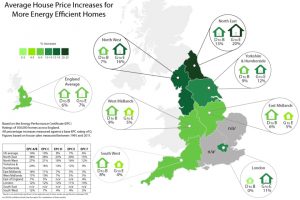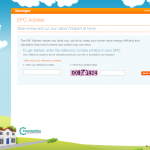
The Benefits of Improving your EPC Rating
An Energy Performance Certificate, or EPC, is required whenever a property is built, sold or rented, and must be obtained before a property can be marketed for sale or rent. It gives a property an energy efficiency rating from A (most efficient) to G (least efficient) and is valid for 10 years. There are several reasons to improve your EPC rating, from cutting down on the everyday running costs of your home, to achieving a higher sale price when you come to sell it. In this blog we’ll be taking a look at the main benefits of improving your EPC rating, and how a smart home fits into this.
Increase Your House Value
 Around half of UK homes currently have an EPC rating of D. Improving your home’s EPC rating can increase it’s asking price by an average of 6% – there are regional variations, though, and EPCs have less influence on prices in the South East, as demand for houses is so high here.
Around half of UK homes currently have an EPC rating of D. Improving your home’s EPC rating can increase it’s asking price by an average of 6% – there are regional variations, though, and EPCs have less influence on prices in the South East, as demand for houses is so high here.
Comply with Legislation
Qualify for Feed-in Tariff
 If you are considering investing in renewable energy and want to benefit from the government’s Feed-In Tariff (FIT) to recoup your investment, then it’s worth bearing in mind that the FIT is linked to the EPC rating of your property. It doesn’t matter how many solar panels you place on your roof, if your EPC rating is less than a D, you won’t qualify for a penny!
If you are considering investing in renewable energy and want to benefit from the government’s Feed-In Tariff (FIT) to recoup your investment, then it’s worth bearing in mind that the FIT is linked to the EPC rating of your property. It doesn’t matter how many solar panels you place on your roof, if your EPC rating is less than a D, you won’t qualify for a penny!
Reduce Running Costs
 An EPC contains estimated energy costs over a three year period for your home, as well as ‘top actions’ for improving efficiency and saving money. However, the estimated energy costs recorded in the certificate do not include the costs of running appliances such as TVs, computers or washing machines, nor does it include any electricity produced by microgeneration.
An EPC contains estimated energy costs over a three year period for your home, as well as ‘top actions’ for improving efficiency and saving money. However, the estimated energy costs recorded in the certificate do not include the costs of running appliances such as TVs, computers or washing machines, nor does it include any electricity produced by microgeneration.
The EPC considers how efficient your heating system is by looking at things like the levels of insulation within the home. A great way to boost your rating and keep your home cosy is to install a zoned heating system. The financial benefits of this can be considerable, too – Ofgem estimates that a zoned heating system could save you up to £400 off an average dual fuel bill of £1385.
Where does Smart Home technology fit in?
Well, the good news is that, the more inefficient your home is now, the more you can benefit from smart home technology, and thus boost your EPC rating. In fact, the impact of installing just a zoned heating system on your EPC rating is quite significant:
| Heating Controls | EPC Improvement |
| Where current controls are programmer, room thermostat and TRV’s | 5 points |
| Where current controls are programmer and room thermostat | 6 points |
| Where current controls are programmer, room thermostat and bypass | 7 points |
| Where current controls are programmer only, or where there are no heating controls | 12 points |
Other Things You Can Do
There’s a plethora of information on the Internet detailing how to create a more energy efficient home, but here are a couple of things to look into if you’re serious about bettering your EPC rating: 
EPC Adviser – a great tool that’s packed with advice to help you reduce your carbon footprint by making your home more energy efficien through insulation, lighting, heating, glazing and more.
Green Deal – a government-backed initiative to help pay for the upfront costs of making energy saving improvements to your home, such as insulation, draught-proofing, double glazing and solar panels. You can use this handy energy grants calculator to search for energy grants.
Want to find out more about improving your EPC rating with smart home technology? Get in touch!